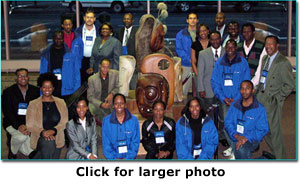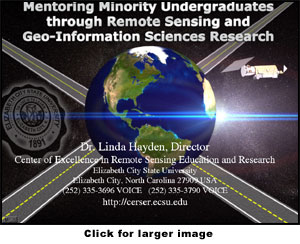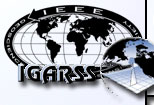 This
year's IEEE International Geoscience and Remote Sensing
Symposium entitled "Science for Society: Exploring
and Managing a Changing Planet" was held in Anchorage,
Alaska. This year marked the 10th anniversary of the GRSS
technical committees. The symposioum was based on how advances
in remote sensing directly affect life on Earth. This basis
reflects today's global economic interdependence where countries
are no only tied together environmentally, but economically
as well.
This
year's IEEE International Geoscience and Remote Sensing
Symposium entitled "Science for Society: Exploring
and Managing a Changing Planet" was held in Anchorage,
Alaska. This year marked the 10th anniversary of the GRSS
technical committees. The symposioum was based on how advances
in remote sensing directly affect life on Earth. This basis
reflects today's global economic interdependence where countries
are no only tied together environmentally, but economically
as well.
Elizabeth
City State University
was represented at
IGARSS by Dr.
Linda Hayden,
Karitsa Williams,
and Danielle Graves.
Dr. Hayden made
a presentation entitled "Mentoring
 Minority
Undergraduates through
Remote Sensing and
Geo-Information Sciences
Research". This
presentation gave a
background of the Center
of Excellence in Remote
Sensing Education and
Research (CERSER)
and it's impact on
students. Danielle
gave a poster presentation
entitled "Science,
Settlement, and Remote
Sensing: Locating
the Remains of the
Lost Colony of NE
North Carolina".
This research drew
on a wide-range of
primary and secondary
sources from history,
geography, archaeology,
and most importantly
remote sensing technology.
Karitsa's poster presentation, "Analyzing
The Effects And Trends
Of El Niño On
Ecuador Using Satellite
Imagery"
dealt with demonstrating
the usefulness of
Digital Earth. Satellite
data was used to
show/predict trends
in El Niño
Southern Oscillation
(ENSO) and its effects
on Ecuador. Karitsa
worked with the Digital
Earth Group as
part of the NASA
Research Experience
in Earth System Science (REESS)
Summer Internship
Program at Norfolk
State University
under Dr. S. Raj
Chaudhury.
Minority
Undergraduates through
Remote Sensing and
Geo-Information Sciences
Research". This
presentation gave a
background of the Center
of Excellence in Remote
Sensing Education and
Research (CERSER)
and it's impact on
students. Danielle
gave a poster presentation
entitled "Science,
Settlement, and Remote
Sensing: Locating
the Remains of the
Lost Colony of NE
North Carolina".
This research drew
on a wide-range of
primary and secondary
sources from history,
geography, archaeology,
and most importantly
remote sensing technology.
Karitsa's poster presentation, "Analyzing
The Effects And Trends
Of El Niño On
Ecuador Using Satellite
Imagery"
dealt with demonstrating
the usefulness of
Digital Earth. Satellite
data was used to
show/predict trends
in El Niño
Southern Oscillation
(ENSO) and its effects
on Ecuador. Karitsa
worked with the Digital
Earth Group as
part of the NASA
Research Experience
in Earth System Science (REESS)
Summer Internship
Program at Norfolk
State University
under Dr. S. Raj
Chaudhury.
.


